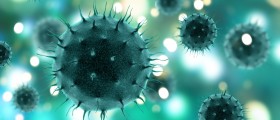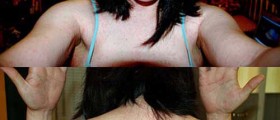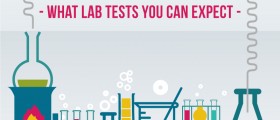
Epstein-Barr virus is a member of the herpes family and the culprit of infectious mononucleosis, an infectious disease that may range from mild flu-like forms to rather severe infection that requires hospitalization. The infection causes by Epstein-Barr virus can also be asymptomatic and be later confirmed with specialized tests. The virus per se is not lethal. However, scientists have revealed that it might have something to do with the onset of a rare form of lymphoma called Burkitt's lymphoma.
Epstein-Barr Virus
Epstein-Barr virus is actually one of the most common viruses affecting humans. Many people contract the virus at some point in their lives. For instance, it is estimated that around 95% of American citizens between 35 and 40 years of age have been infected with Epstein-Barr virus.
The virus attacks people of all ages. Only infants remain protected by the mother's antibodies passed with the breast milk. Once breastfeeding ceases, the infection may easily occur. Infection caused by Epstein Barr virus is in childhood usually brief or asymptomatic while in adolescence and young adulthood it generally develops in the form of infective mononucleosis.
Infectious mononucleosis is characterized by increased body temperature, sore throat and swollen lymph nodes (usually the neck lymph nodes). These characteristics of the infection may be also seen in other viral illnesses such as infection caused by adenovirus so it is usually rather challenging to confirm the infection only according to physical findings. More severe forms of the infection are associated with hepatomegaly or spleenomegaly, heart problems and rarely involvement of the central nervous system.
The diagnosis is based on clinical findings but is supported by laboratory tests which either confirm the presence of the virus or rule it out. For instance, one may undergo serologic tests which show elevated white blood cell count and the presence of an increased number of certain, atypical leukocytes. "Mono spot" test also shows positive results.
The symptoms and signs of the infection withdraw within 1-2 months. The virus however, remains dormant for the rest of the person's life. This means that it can reactivate and be excreted via the saliva, contributing to further transmission. Reactivation of the virus is not connected with any physical manifestations.
One of the most severe consequences of contracting Epstein-Barr virus is its capability to precipitate certain cancers. Namely, the virus is closely connected with the onset of Burkitt's lymphoma and is also a potential trigger of nasopharyngeal carcinoma.
As far as treatment for infectious mononucleosis is concerned there is practically no cure. Instead doctors provide with supportive care and recommend symptomatic treatment. In some cases patients might be prescribed a short course of corticosteroid which deals with extreme swelling of the throat or tonsils.
All in all, infection eventually resolves leaving the virus inside the body. Now, under certain circumstances, when the infection lingers for more than 6 months, patients are said to suffer from chronic EBV infection.
Test for Epstein-Barr Virus
In order to definitely confirm the presence of Epstein-Barr virus doctors order a blood test which detects antibodies to the virus, if these have been synthesized.
All that is required is a blood sample. The blood is usually taken from a vein. The sample is sent to a laboratory and is evaluated by a specialist. The antibodies are not present in sufficient amount in the initial stage of the disease. This is why testing should be postponed or at least repeated 10 days to 2 weeks after the initial testing. The test can accurately confirm infection that have occurred in the past while recent infections may not be properly evaluated.
The one needs not to worry about preparation for the test because there is not any specific regimes required prior to the testing. Certain amount of blood is drawn from a vein. This might cause discomfort or be painful but generally the needle insertion triggers only a prickly or stinging sensation.
In the majority of cases the laboratory test for EBV is quite accurate and specific. The samples taken during the acute and convalescent phase of the disease will not reveal a significant change in antibody level. Doctors are capable of differentiating susceptibility to EBV, a recent infection, the infection that took place in the past or reactivation of Epstein-Barr virus infection.
There are several antigen complexes tested. The early antigen is the viral capsid antigen. Another antigen tested is the EBV nuclear antigen. It is also crucial to evaluate and differentiate immunoglobulins G and M subclasses to the viral capsid antigen because these actually determine whether the infection is acute or has happened before. Namely, IgM to the viral capsid is detected between the 4th and 6th week of the infection. IgG to the viral capsid, on the other hand, is synthesized in the acute phase. This immunoglobulin reaches its peak 2-3 weeks after the onset of the infection. After that the IgG declines but remains for the rest of the patient's life, confirming the previous infection.
And finally, even when testing confirms reactivation of the infection, these finding does not have to be related to the current medical condition of the tested individual. Many people who are in fact healthy may have elevated level of antibodies to the EBV early antigen for many years after the initial infection.

















Your thoughts on this
Loading...